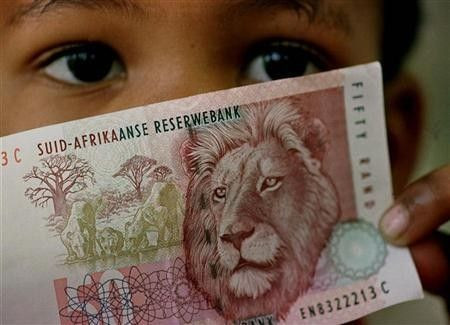S.Africa rand surges, stocks sold on value worries

South Africa's rand jumped more than 1.5 percent against the dollar in late trade on Wednesday, helped by an aggressive sell-off in the U.S. currency and better-than-expected local data.
South African stocks edged lower for the second straight day as investors continued to worry that the record high hit earlier this week signalled share prices are inflated.
Consumer inflation for January quickened and retail sales for December increased more than expected, data showed, boosting the likelihood of a rate hike later in the year.
The rand traded 1.5 percent firmer at 7.2350 to the dollar as of 1545 GMT, compared to its close of 7.3450 on Tuesday. It briefly touched 7.2301 earlier, trading in a 7.24/34 range for most of the day.
We started off this morning pretty weak, we tested that same 7.34/7.35 area, but then we found quite a big (dollar) sell order from an international, a local currency trader said.
On the bourse, shares continued to suffer from worries about valuation.
Johannesburg's All-Share index, the widest measure of South African stock performance, briefly hit a record high on Monday, when the benchmark Top-40 index closed at its highest in 2-1/2 years.
Such levels suggest that shares in Africa's biggest economy are overvalued, said John Biccard, a fund manager at Investec Asset Management.
This is the time you should be taking your money offshore, Biccard told reporters at a briefing in Johannesburg.
The run up in higher-risk, emerging markets stocks has been supported by U.S. stimulus, which has created a flood of easy money, he said.
I find it quite amazing that our market is back at the old high because there is really very little value left. But in a world where there is so much easy money, the money has to go somewhere.
The All-Share index finished down 0.85 percent at 32,778.12. The index hit a record high of 33,334.55 on Monday, surpassing the previous record set in May 2008.
The Top-40 index of blue-chip stocks closed down 1 percent at 29,578.17. It booked its highest close since May 2008 on Monday and is trading at an average of 18.8 times earnings -- well beyond the Dow Jones industrial average, which is currently at 14.9 times earnings, according to Thomson Reuters data.
Notable losers included Johannesburg-traded shares of global miner BHP Billiton, which slid nearly 3 percent to 287.25 rand. Investors overlooked its near doubling of first-half profit, focusing instead on a lower-than-expected dividend.
Anglo American, dropped 2.3 percent to 392.14 rand. Shares of the miner have risen about 16 percent over the last three months.
Shares of African Oxygen, the industrial gases firm majority owned by Germany's Linde Group, fell 2.3 percent to 19 rand. The company reported a 26 percent decline in full-year earnings, citing tough business conditions and equipment failures.
Government bonds ended the session firmer. The yield on the benchmark 2015 paper closed at 7.77 percent on the JSE, compared with 7.80 on Tuesday. The 2026 note was at 8.635 percent from a 8.64 close previously.
© Copyright Thomson Reuters 2024. All rights reserved.





















